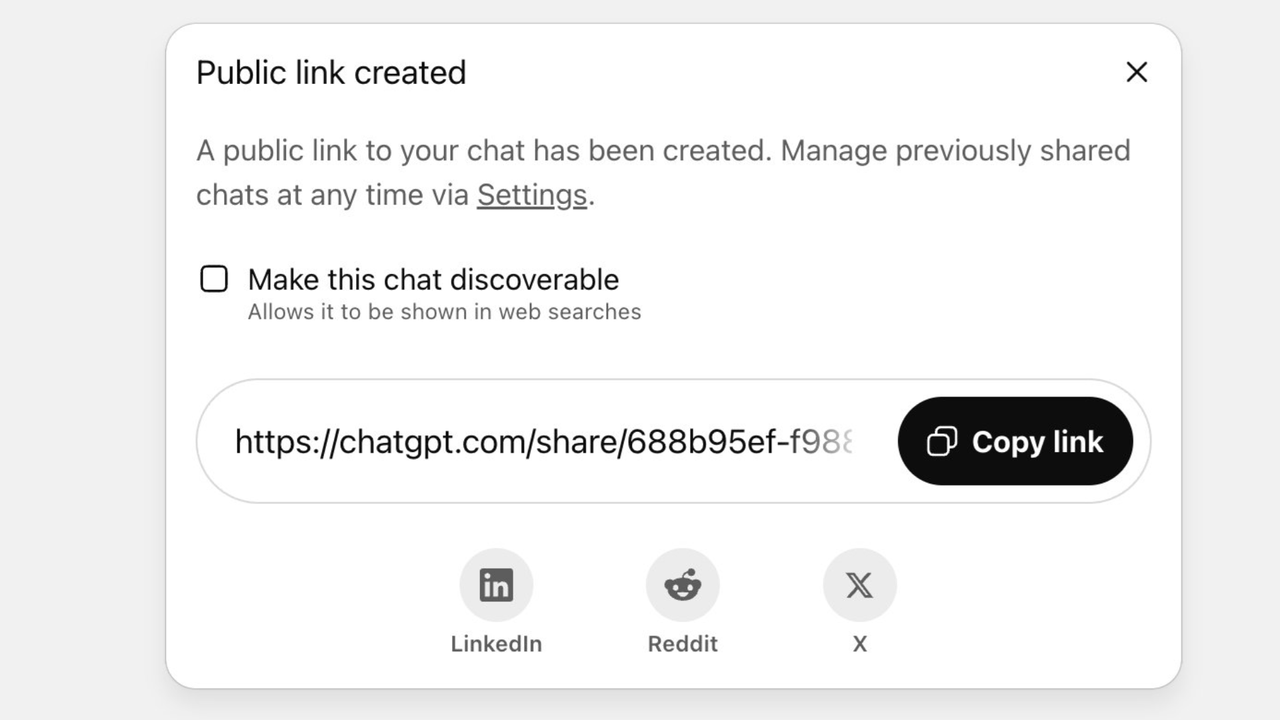OpenAI pulls chat sharing tool after Google search privacy scare
OpenAI ends public chat sharing feature following unanticipated revelations.
OpenAI has removed the ChatGPT feature, allowing people to search through public conversations with a search engineMany users learned too late that enabling the “discoverable” setting could make chats accessible to anyone onlineThe decision came after several people saw their sensitive and private information publicizedOpenAI has abruptly shut down a feature in ChatGPT that allowed chats shared publicly to be searchable through Google. Users were unpleasantly surprised to discover that private information shared with ChatGPT was now publicly available as a Google search result.Dane Stuckey, OpenAI’s Chief Information Security Officer, announced the shutdown on Thursday, with the feature disabled on Friday morning. OpenAI has also begun scrubbing search engine indexes of the previously shared conversations.OpenAI designed the “Make this link discoverable” checkbox, which they had clicked on, to give more people access to potentially helpful conversations between ChatGPT and different users. In practice, it opened the door to a new kind of digital exposure, where criminal confessions, personal secrets, and corporate practices were just a few keywords away from turning up in a Google Search.This was not some obscure opt-out setting hidden in a developer console. It was right there in the sharing menu of any ChatGPT conversation users chose to turn into a public link. However, while OpenAI believed the wording was clear about what users were doing, many users apparently did not understand. They thought the link would remain private or unfindable unless explicitly shared.For the average person using ChatGPT to plan a resignation letter, troubleshoot a relationship, or work on a legal strategy, that’s more than a technical hiccup. It’s a gut check. If you’ve ever shared a link to a conversation, there’s a nonzero chance someone found it by a Google search.Some of the reported indexed conversations included internal job applicant evaluations, sensitive mental health disclosures, confessions of crime, and proprietary software code. People were talking to ChatGPT as if it were private, but for anyone who toggled that setting, it wasn’t.We just removed a feature from @ChatGPTapp that allowed users to make their conversations discoverable by search engines, such as Google. This was a short-lived experiment to help people discover useful conversations. This feature required users to opt-in, first by picking a chat… pic.twitter.com/mGI3lF05UaJuly 31, 2025Searchable secretsTo OpenAI’s credit, the company pulled the feature quickly. But the fallout raises important questions not just about privacy, but about how much users can reasonably be expected to understand about the tools they’re using. The “discoverable” checkbox didn’t hide behind a wall, but it also didn’t do a great job of communicating the scope of its consequences. It’s one thing to share a link, but indexing it in global search engines indefinitely is something else.It is fascinating what this says about how users behave with AI. They confide in it, test ideas, vent frustrations, and draft things they’d never type into a search bar. If you’ve ever shared a ChatGPT conversation, it’s worth checking whether that link is still live.While OpenAI is working with Google and other search engines to purge previously indexed content, search crawlers have long memories. Some content may linger for a while, even if deleted. OpenAI disabled the feature quickly, but the damage may already be done for some users.Hopefully, the lesson will stick with the public, much like the idea of not deleting embarrassing browser histories has transitioned from a common joke to something only the most clueless person would forget to do. The magic of tools like ChatGPT lies in how they create the illusion of a conversation. But if you forget that it is still an illusion, you might not notice risks like buttons that send your digital heart-to-heart straight to Google.You might also likeChatGPT crosses a new AI threshold by beating the Turing testAI took a huge leap in IQ, and now a quarter of Gen Z thinks AI is consciousChatGPT model matchup - I pitted OpenAI's o3, o4-mini, GPT-4o, and GPT-4.5 AI models against each other and the results surprised me
